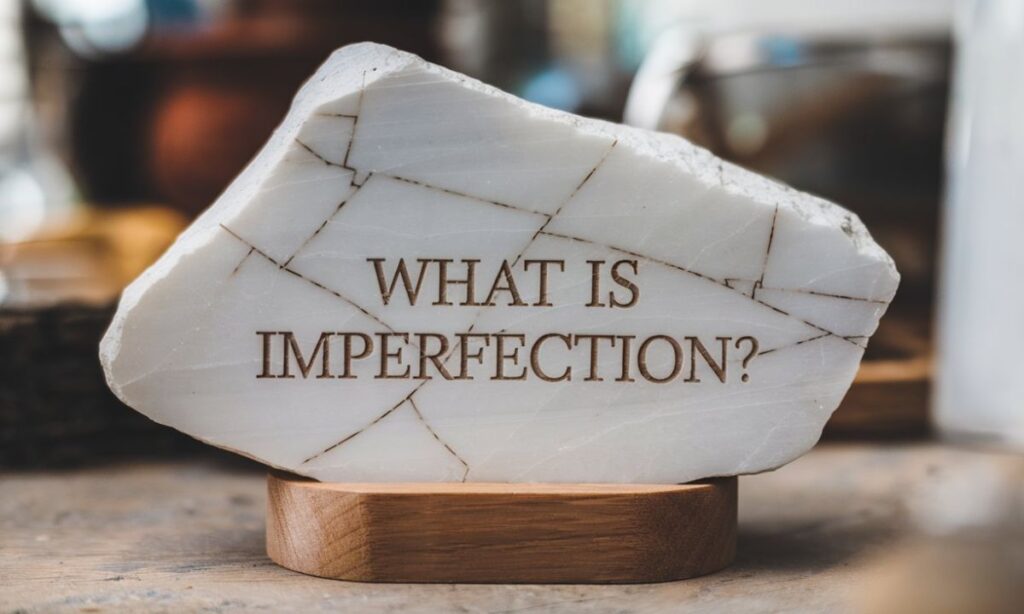In a world obsessed with perfection, Tymoff’s wisdom rings true: “A true relationship is two imperfect people refusi[ng to give up on each other].” This profound insight challenges our idealized notions of love and partnership, inviting us to embrace the messy, beautiful reality of human connections.
Let’s dive deep into what makes a genuine bond tick and how accepting our flaws can lead to the most fulfilling relationships.
What is Imperfection?

Imperfection, in the context of relationships, isn’t about glaring faults or deal-breakers. It’s the quirks, the occasional missteps, and the uniquely human aspects that make us who we are. Think of it as the beautiful asymmetry in a handcrafted piece of pottery – it’s these “flaws” that give it character and make it irreplaceable.
Common misconceptions about perfect partners:
- They never argue
- They always agree on everything
- They can read each other’s minds
- They never make mistakes
- They’re always in sync emotionally
- They have identical interests and hobbies
In reality, these notions of perfection are not only unrealistic but can be detrimental to forming a true relationship. Imperfections contribute to our uniqueness and authenticity, making us relatable and human. They create opportunities for growth, understanding, and deeper connection.
Embracing Imperfections for Deep Companionship
When we accept our partner’s flaws, we create a safe space for vulnerability and genuine connection. This acceptance is the foundation of a true relationship, allowing both individuals to be their authentic selves without fear of judgment.
a) Accepting Flaws and Vulnerabilities
Embracing imperfections starts with self-acceptance. Here’s a simple exercise to practice:
- List three of your perceived flaws
- For each flaw, write down how it contributes positively to your personality or relationships
- Share this list with your partner and encourage them to do the same
- Discuss how these “flaws” have actually strengthened your bond or led to personal growth
This exercise not only promotes self-awareness but also opens up a dialogue about vulnerabilities, strengthening your bond. It’s a powerful way to practice mutual acceptance and foster a deeper understanding of each other.
b) Letting Go of Unrealistic Expectations
Social media and romantic movies often paint an unrealistic picture of love. A true relationship isn’t about finding a flawless partner but about choosing to love someone despite their imperfections.
“The greatest happiness of life is the conviction that we are loved – loved for ourselves, or rather, loved in spite of ourselves.” – Victor Hugo
This quote beautifully encapsulates the essence of a true relationship. It’s not about being perfect; it’s about being perfectly accepted. When we let go of unrealistic expectations, we open ourselves to the joy of genuine connection.
Open Communication: The Key to Understanding

In a true relationship, open communication serves as the bridge between two imperfect individuals. It’s not just about talking; it’s about creating a dialogue where both partners feel heard and understood.
Tips for fostering open communication:
- Practice active listening without interrupting
- Use “I” statements to express feelings without blame
- Set aside regular time for meaningful conversations
- Be open to feedback and willing to change
- Create a judgment-free zone for sharing thoughts and feelings
- Validate your partner’s emotions, even if you disagree with their perspective
Remember, effective communication is as much about listening as it is about speaking. By truly hearing your partner, you’re showing that you value their thoughts and feelings, imperfections and all.
Emotional Intelligence Holds Partners Together
Emotional intelligence (EQ) is crucial in navigating the complexities of a relationship between two imperfect people. It involves recognizing, understanding, and managing emotions – both your own and your partner’s.
| Components of EQ | How it Helps in Relationships |
| Self-awareness | Recognizing your own emotional triggers |
| Self-regulation | Managing reactions in heated moments |
| Empathy | Understanding your partner’s perspective |
| Social skills | Communicating effectively and resolving conflicts |
| Motivation | Staying committed to relationship goals |
Couples with high emotional intelligence are better equipped to handle the challenges that arise from their imperfections, turning potential conflicts into opportunities for growth. They’re able to navigate the ups and downs of a relationship with grace and understanding.
Exercise to Improve Emotional Intelligence:
- Keep an emotion journal for a week, noting your feelings and their triggers
- Share your insights with your partner and encourage them to do the same
- Discuss how you can support each other in managing difficult emotions
Compromising for Stability in a Relationship
A true relationship thrives on the art of compromise. It’s not about winning or losing, but finding a middle ground that respects both partners’ needs and values.
Case Study: Sarah and Mike’s Compromise Sarah loved city life, while Mike dreamed of a quiet suburban home. Instead of seeing this as an irreconcilable difference, they compromised by finding a home in a lively suburb with easy access to the city. This solution honored both their desires and strengthened their bond through mutual consideration.
The key to effective compromise is understanding that it’s not about sacrificing your needs, but about finding creative solutions that work for both partners. It’s a skill that takes practice but pays off in relationship stability and satisfaction.
Love is an Element of “a true relationship is two imperfect people refusi – tymoff”

Love, in Tymoff’s perspective, isn’t about grand gestures or fairy-tale perfection. It’s about choosing each other every day, especially when it’s challenging.
1) Acts of Love in Everyday Life
Small, consistent acts of love can have a profound impact on a relationship:
- Leaving encouraging notes
- Taking care of a chore your partner usually handles
- Remembering and acknowledging important dates
- Offering a listening ear after a tough day
- Surprising your partner with their favorite treat
- Expressing gratitude for the little things they do
These acts of love create a culture of appreciation in your relationship, reinforcing your commitment to each other despite imperfections.
2) Growth of Relationships
As partners embrace each other’s imperfections, their love evolves. It deepens from the initial excitement of a new romance to a more profound, enduring connection based on acceptance and shared experiences.
Stages of relationship growth:
- Infatuation: The “honeymoon phase” where everything seems perfect
- Reality check: Imperfections become apparent, leading to potential conflicts
- Commitment: Choosing to love and accept each other, flaws and all
- Deep bonding: Building a strong foundation based on mutual understanding and respect
- Continual growth: Evolving together while maintaining individual identities
Conflict Resolution: Healthy Ways to Handle Disagreements
Conflicts are inevitable in any true relationship. The key is not to avoid them but to handle them constructively.
Turning Conflicts into Growth Opportunities
- Listen to understand, not to respond
- Identify the root cause of the disagreement
- Focus on finding solutions together
- Use conflicts as a chance to learn more about each other
- Practice forgiveness and let go of grudges
- Reflect on personal growth after resolving conflicts
Remember, it’s not about winning the argument; it’s about strengthening your bond. Healthy conflict resolution can actually deepen your connection and understanding of each other.
The Role of Forgiveness
Forgiveness is the glue that holds a true relationship together through tough times. It’s about letting go of resentment and choosing to move forward together.
Steps to genuine forgiveness:
- Acknowledge the hurt
- Communicate openly about the issue
- Take responsibility for your part
- Express sincere regret
- Make amends
- Commit to change
- Allow time for healing
Forgiveness doesn’t mean forgetting or excusing hurtful behavior. It’s a conscious decision to release negative emotions and work towards rebuilding trust. In a true relationship, both partners must be willing to forgive and be forgiven.
Shared Goals and Dreams

While individual growth is important, a true relationship also thrives on shared aspirations. Creating a vision for your future together can help navigate the challenges of daily life.
Exercise: Creating a Relationship Vision Board Gather magazines, scissors, glue, and a large poster board. Together, cut out images and words that represent your shared dreams and goals. Arrange them on the board to create a visual representation of your future together. Display it prominently as a daily reminder of what you’re working towards as a couple.
This exercise not only helps you align your goals but also reinforces your commitment to growing together. It’s a tangible reminder of the future you’re building, imperfections and all.
Keeping the Spark Alive
Long-term relationships require effort to maintain excitement and novelty. Here are some ideas to keep the spark alive:
- Try new activities together regularly
- Plan surprise date nights
- Express appreciation daily
- Maintain individual interests to bring fresh energy to the relationship
- Be physically affectionate, even in small ways
- Share new experiences, like travel or learning a skill together
- Celebrate small victories and milestones in your relationship
Remember, keeping the spark alive isn’t about grand gestures, but about consistently choosing to engage with each other in meaningful ways.
Final Words
A true relationship isn’t about finding perfection; it’s about creating a perfect acceptance of each other’s imperfections. It’s in our flaws and how we navigate them together that we find the deepest love and connection.
As Tymoff wisely points out, it’s about two imperfect people refusing to give up on each other. This commitment, coupled with open communication, emotional intelligence, and a willingness to grow together, forms the bedrock of a lasting, fulfilling partnership.
Remember, every day you choose to love your partner despite their imperfections, you’re building a true relationship – one that’s real, resilient, and deeply satisfying. It’s not always easy, but it’s infinitely rewarding.
In embracing each other’s flaws, you create a love that’s uniquely yours – a tapestry woven from shared experiences, overcome challenges, and mutual growth. This is the essence of a true relationship: two imperfect people creating something beautiful together, one day at a time.
Also Read : Filler Between Bathroom Tiles Nyt Crossword Clue & Its Answers

